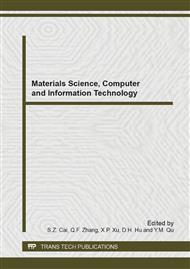[1]
Morimoto RI. Cells in stress: transcriptional activation of heat shock genes [J]. Science, 1993 259 (5100) 1409-1410.
DOI: 10.1126/science.8451637
Google Scholar
[2]
Ciocca DR, Calderwood SK. Heat shock proteins in cancers: diagnostic, prognostic, predictive, and treatment implications [J]. Cell Stress Chaperones, 2005 10 (2) 86-103.
DOI: 10.1379/csc-99r.1
Google Scholar
[3]
Lebret T, Watson RW, Molinie V, O'neill A, Gabriel C, Fitzpatrick JM, Botto H. Heat shock proteins HSP27, HSP60, HSP70, and HSP90: expression in bladder carcinoma [J]. Cancer, 2003 98 (5) 970-977.
DOI: 10.1002/cncr.11594
Google Scholar
[4]
Lee AS. The glucose-regulated proteins: stress induction and clinical applications [J]. Trends. Biochem. Sci. 2001 26 (8) 504-510.
DOI: 10.1016/s0968-0004(01)01908-9
Google Scholar
[5]
Wang XP, Zhou YX, Ying XP, Guo LS, Zhao YH, Fang Y. Interaction between heat shock protein 72 and alpha-fetoprotein in human hepatocellular carcinoma [J]. Clinica Chimica Acta, 2007 379 (1) 158-162.
DOI: 10.1016/j.cca.2006.12.015
Google Scholar
[6]
Wang XP, Chen W, Li X, Lin HP, Wang QX. Heat shock protein 72 associated with CD44v6 in human colonic adenocarcinoma [J]. Cell Biology International, 2008 32 (7) 860-864.
DOI: 10.1016/j.cellbi.2008.02.009
Google Scholar
[7]
Wang Q, An L, Chen Y, Yue S. Expression of endoplasmic reticulum molecular chaperon GRP96 in human lung cancer tissues and its clinical significance [J]. Chin. Med. J. 2002 115 (11) 1615-1619.
Google Scholar
[8]
Wang XP, Wang QX, Ying XP. Correlation between Clinicopathology and Expression of Heat Shock Protein 72 and Glycoprotein 96 in Human Gastric Adenocarcinoma [J]. The Tohoku Journal of Experimental Medicine, 2007 212 (5) 35-41.
DOI: 10.1620/tjem.212.35
Google Scholar
[9]
Wang XP, Wang QX, Guo LS, Ying XP, Zhao YH. Immunolocalization of Heat Shock Protein 72 and Glycoprotein 96 in Human Colonic Adenocarcinoma [J]. Acta Histochemica, 2008 110 (2) 117-123.
DOI: 10.1016/j.acthis.2007.10.013
Google Scholar
[10]
Fisher DL, Mandart E, Doree M. Hsp90 is required for c-Mos activation and biphasic MAP kinase activation in Xenopus oocytes [J]. EMBO J. 2000 19 (7) 1516-1524.
DOI: 10.1093/emboj/19.7.1516
Google Scholar
[11]
Wang XP, Lin HP, Wang QX, Li SZ, Sun LJ, Yang YX. HSP72 and gp96 in gastroenterological cancers [J]. Clinica Chmica Acta, 2013 417 (1) 73-79.
DOI: 10.1016/j.cca.2012.12.017
Google Scholar


